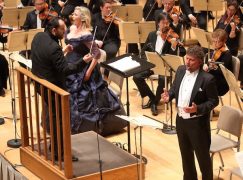Jonas Kaufmann’s Tristan: first reviews and video
mainWith Andris Nelsons and the Boston Symphony.
Jonas Kaufmann and Camilla Nylund were each making role debuts as the title doomed lovers.
Both are prominent Wagnerians, having performed lead roles at the Bayreuth Festival, the Metropolitan Opera and in many of Europe’s major houses. And both, too, possess a warm tone that captured a sense of stirring humanity in Wagner’s lush score. The Liebesnacht featured the two singers in some of the most poignant moments of the evening as each delivered Wagner’s soulful duet with soft yet radiant lines.
Kaufmann, who has drawn critical acclaim for his performances of Parsifal at the Metropolitan Opera, also sang with power and depth in the opening of the scene between the two lovers. Bold and ringing clearly, his voice brought a genuine heldentenor quality to the role.
In the portions of the act that demand powerful singing, Nylund, unfortunately, had trouble filling the hall. Her voice is rich and brilliant but it lacked the power and intensity to cut through Wagner’s thick orchestration in her opening scene.
From the Boston Globe:
Standing behind music stands on opposite sides of the podium, Kaufmann and Nylund sang their impassioned duet while facing the audience oratorio-style, and both of them relied heavily on their vocal scores.
Within that scope Kaufmann delivered, despite a few less steady moments. Certainly when he telegraphed Tristan’s ardor with ringing tenorial power, or when he sang of night’s gentle charms with beautifully shaded tones that somehow combined tenderness and intensity, you sensed the winning Tristan he could eventually become. Nylund, who is also still finding her way into this daunting role, sang honorably and at her best moments, registered her character’s impatient ecstasies with bright vocal radiance.

Photo: Hilary Scott/BCMR
Listen to a performance clip:





Comments